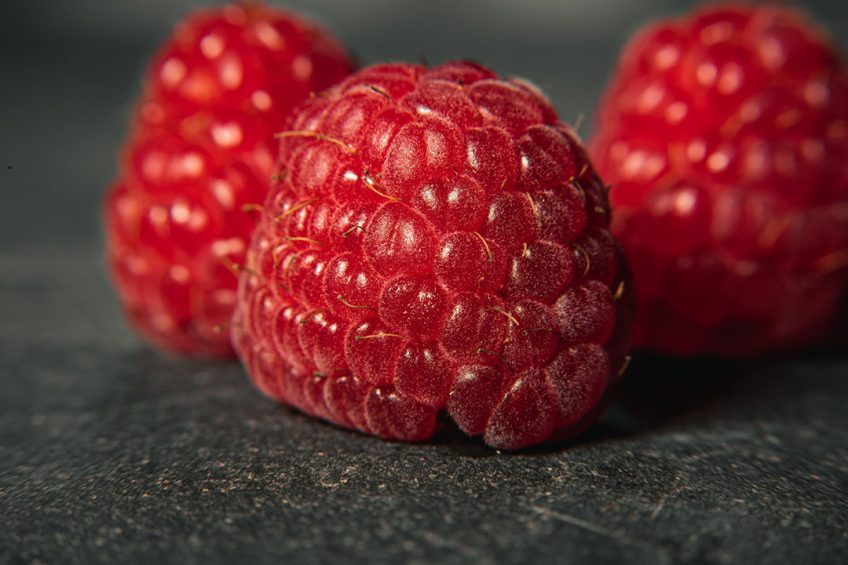Raspberry flavour invites piglets to explore and eat

Piglets are curious, sensitive to smell and love sweet flavours. Mixing fruity flavours such as raspberry through the feed encourages their interest.
Weaning is a critical phase for piglets. The switch from liquid to solid feed is a stressful period in which the animals often tend to reduce their intake, which can affect their gut health and consequently their overall health and performance. It is advisable to stimulate piglets’ curiosity in order to increase their interest in solid feed and encourage them to try it, therefore triggering further feed intake. Pigs are extremely sensitive animals, with many more olfactory receptors than humans, therefore flavours may be a good way to catch piglets’ interest, as long as they are adequately chosen.
A series of 3 trials were performed in China on weaning piglets in order to compare their behaviour when faced with raspberry-flavoured feed (by Pancosma) in comparison to a more regular milk-flavoured feed, sold on the Chinese market. In the first phase, the piglets’ respective interest in both flavours was evaluated; in the second and third phases, the results for intake and performance were investigated.
Stimulate exploratory behaviour
A first preference trial was performed on 40 weaned piglets, randomly allocated to 4 pens of 10 piglets. The animals were weaned at 21–23 days and weighed 6–7kg. They were given free access to 2 different treatments: one containing the milk flavour and the other containing raspberry flavour, both dosed at 300 grammes/tonne. The trial lasted 4 days during which the number of contacts between the piglets and each feed were counted every 5 minutes over a 20-minute period.
Results showed that there were significantly more contacts with the raspberry-flavoured treatment than with the milk-flavoured feed throughout 20-minute periods (see Figure 1A) and every day (see Figure 1B).
Figure 1 – Evolution of piglet exploratory behaviour over time; averaged results.

While exploratory behaviour was constant for the milk-flavoured feed over time throughout the trial, contacts were increasingly numerous each day for the treatment with raspberry flavour.
Exploratory behaviour was therefore stimulated by the raspberry flavour, with piglets being more and more curious and particularly attracted by this treatment.
That can be explained by the fact that fruity flavours contain molecules that are generally more volatile than those used in milky flavours, which are heavier. The raspberry-flavoured smell therefore spreads more easily into the air, catching the animals’ interest first.

Raspberry flavour improves feed intake
The assumption was that increasing piglets’ exploratory behaviour will increase feed intake. Therefore a second trial was set up to confirm that hypothesis. The set-up was similar to the first preference trial: 40 animals randomly allocated to 4 pens. That was a free choice trial that lasted 7 days. Animals had access to the same feed choices as for the first trial. Piglets were fed ad libitum and water was freely available. Daily feed intake was weighed and recorded per treatment and per pen.
Feed intake (see Figure 2) followed the same trend as preference in the previous trial: intake was indeed higher for the raspberry-flavoured feed than for the milk-flavoured feed. Intake also increased throughout the trial, in line with previous observations; that is, piglets became increasingly curious about the raspberry flavour. Those results are consistent with the observations of the first trial regarding preference, and they validate the hypothesis that stimulating exploratory behaviour is a good way to increase feed intake.
Figure 2 – Feed intake in free choice trial (left hand) and imposed choice trial (right hand).

Improving pig performance
A third trial was performed in order to validate the effect of a higher intake on piglet performance. It was an imposed choice set-up. In total, 96 piglets were randomly divided into 2 groups: each group had access to 1 feed only (either milk flavour or raspberry flavour); each group was then subdivided into 4 different pens of 12 animals each. The researchers recorded the piglets’ initial and final weights; they measured feed intake and average daily weight gain and calculated feed conversion ratio (FCR). The trial lasted 14 days.
Results on feed intake were similar to the previous free choice trial; average cumulated feed intake was higher for the raspberry-flavoured feed than for the milk-flavoured feed. Piglets thus once again showed a preference for the raspberry-flavoured feed with an improvement in feed consumption. This significantly higher feed intake was associated with a significantly higher average body weight gain and a significantly higher final body weight in the case of raspberry-flavoured feed. FCR was numerically improved in the case of raspberry-flavoured feed.
Improving feed intake
Flavours with more volatile molecules may be a good incentive to encourage exploratory behaviour in piglets. The raspberry flavour consistently improves feed intake compared to milk-flavoured feed in free choice trials as well as in imposed choice trials. The higher feed intake obtained with the raspberry flavour results in better performance of the animals, with higher body weight gain as well as higher final body weight of the piglets.
References available upon request.











